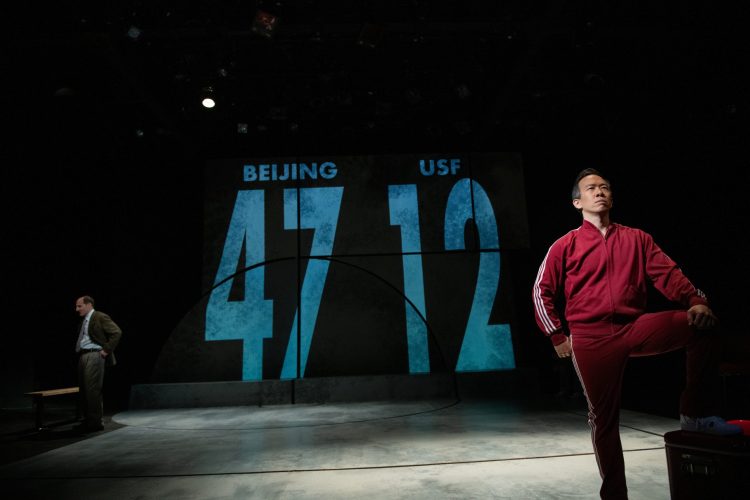Playwright Lauren Yee’s work is known for its naturalistic dialogue, dark humor, and personal, emotional cores. The Great Leap, now playing at Portland Stage, was inspired by her father, who mastered streetball in San Francisco and traveled to China in the same way lead character Manfred Lum does in 1989.
Director Natsu Onoda Power and actors Ray Yamamoto (Manfred) and Jim Shankman* (Saul Slezac) sat down for a conversation soon after rehearsals began.
*Member, Actor’s Equity Association
TODD BRIAN BACKUS: What’s something that you’ve been really excited about for this play?
NATSU ONODA POWER: I’ve admired Lauren Yee’s work for a long time and it’s the first time I get to direct one of her plays. And I’ve always been very jealous of sports because the sports industry has real fans who spend loads of money to go to their games and really identify with the experience in a way that theater doesn’t. So, I’m really excited to do a show about sports—the enthusiastic sense of belonging and the participation in the moment.
JIM SHANKMAN: My character is so foul mouthed in a really funny but real way. It’s been a joy to swear along with Saul.
RAY YAMAMOTO: I like the pace a lot. It’s a beautiful show to watch, the design and the lighting. I’m excited about this set.
The story this play tells is incredibly personal, but it also becomes global. Not just in terms of setting—going from San Francisco to Beijing—but in terms of global politics of what is happening in the world in 1989. What is something that helps you navigate that dichotomy?
SHANKMAN: Well, politics is very personal these days. But Louis B. Mayer said you can tell any story you want as long as there’s a love story too. And there is a love story here, it’s very sneaky and it doesn’t appear at first. You think it’s a basketball play, or a political play, but it turns out to be about love.
ONODA POWER: Multiple love stories.
YAMAMOTO: The play showcases different aspects of Asian Americanness, like very different levels of it. My character’s experience is different from Connie’s, which is obviously different from Wen Chang’s. It’s non-monolithic in how it portrays Asian Americans. You can see the vast array of diversity.
For Jim and Ray, what is something that you really relate to about your character?
SHANKMAN: The thing I relate to the most is his competitive spirit. He may appear to be down on his luck, but he doesn’t see it that way. He’s a fighter, he’s a scrapper, he thinks he’s that close to winning all the time. Committed.
YAMAMOTO: It’s kind of the same for me. The tenacity, the relentlessness of the character. And that he’s short and plays basketball. That’s a real thing! Basketball is a game of height, you know? And being 5’7” and trying to play the game against the giants really helps you prepare for life’s obstacles.
Okay, five seconds on the clock, it’s your final shot: how would you pitch this show?
SHANKMAN: If you love basketball, there’s a lot of interesting theater in this play and if you love theater there’s a lot of interesting basketball in this play.
YAMAMOTO: Well, look at this face! [Gestures to Shankman] And look at this face! [Gestures to himself, everyone starts laughing.] Why wouldn’t you go see this!? You need to see this on stage.
ONODA POWER: And it’s really funny! And it sneaks up on you and makes you cry at the most unexpected moments.
 Copy the Story Link
Copy the Story Link
Comments are not available on this story.
Send questions/comments to the editors.


